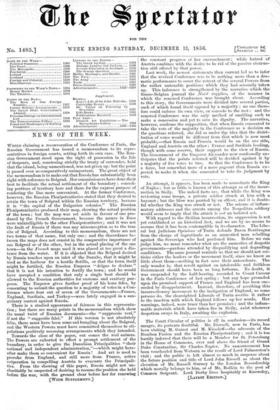An , attempt, it appears, has been made to assassinate the
King of Naples ; but as little is known of this attempt as of the insur- rection in Sicily. The naked facts ate, that while the King was reviewing some troops, a private soldier struck at him with a bayonet ; but the blow was parried by an officer, and it is doubt- ful whether the King was struck or not. The seizure of inflam- matory addresses and the arrests among the Neapolitan soldiery would seem to imply that the attack is not an isolated act.
With regard to the Sicilian insurrection, its suppression is not yet established as an historical fact, and we are by no means to assume that -it has been contemptible in its character. The Libe- ral but judicious Opinione of Turin defends Baron Bentivegna from the charge of ingratitude as an amnestied man rebelling against the Sovereign who had pardoned him. Before we can judge him, we must remember what are the amnesties of despotic governments—pardons attended by disqualifying and degrading conditions. The same journal reminds us that we should not cri- ticize either the leaders or the movement itself, since we know so little about them—nothing in fact save their antecedents. The only wonder is, that revolt against an intolerable and faithless Government should have been so long forborne. No doubt, it was suspended by the half-hearing accorded to Count Cavour in the Paris Conference of last spring ; but any hope grounded upon the promised support of France and England has been suc- ceeded by disappointment. Instead, therefore, of ascribing this insurrectionary movement to the instigation of England, as some persons do, the clearsighted Liberals of Turin ascribe it rather to the inaction with which England follows up her words. Her warnings, indeed, were truer than her promises ; and the inflam- mable materials which have taken fire in Sicily, exist wherever despotism sways in Italy, awaiting the explosion.
































